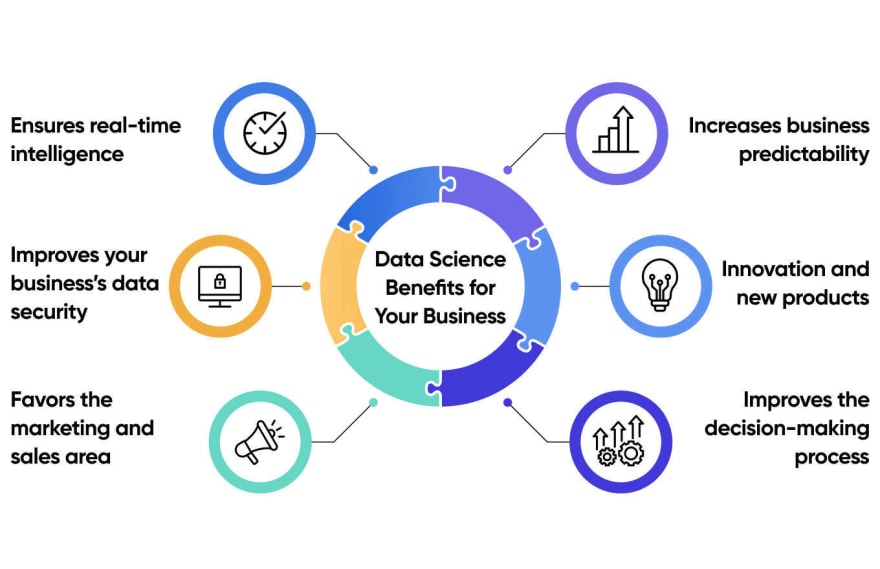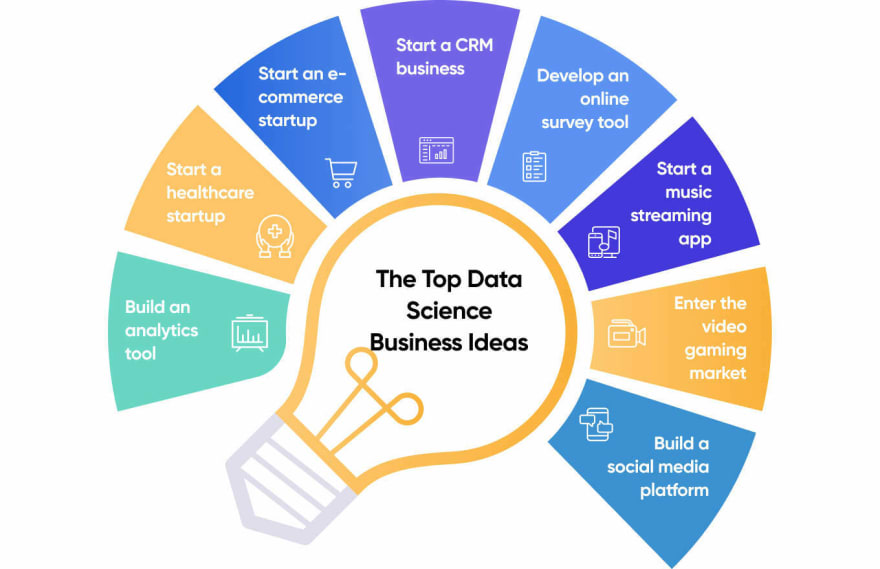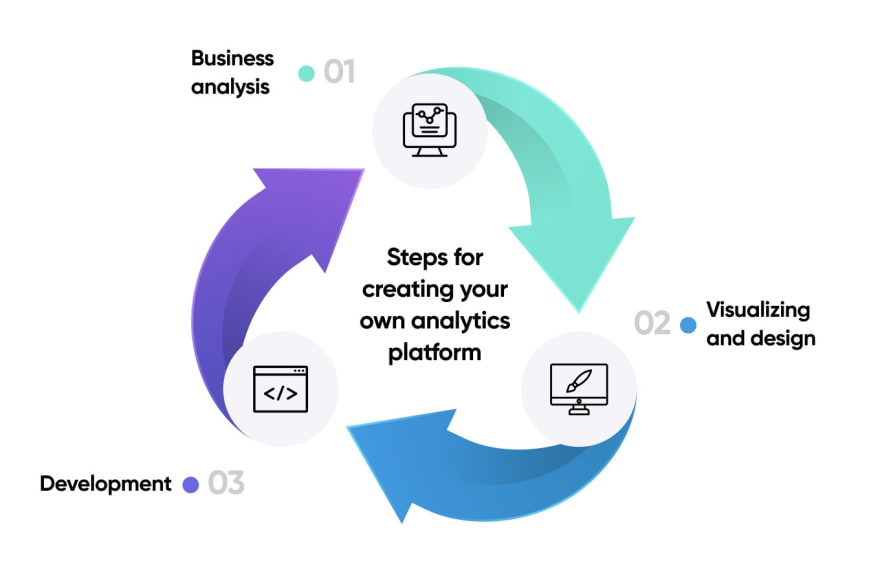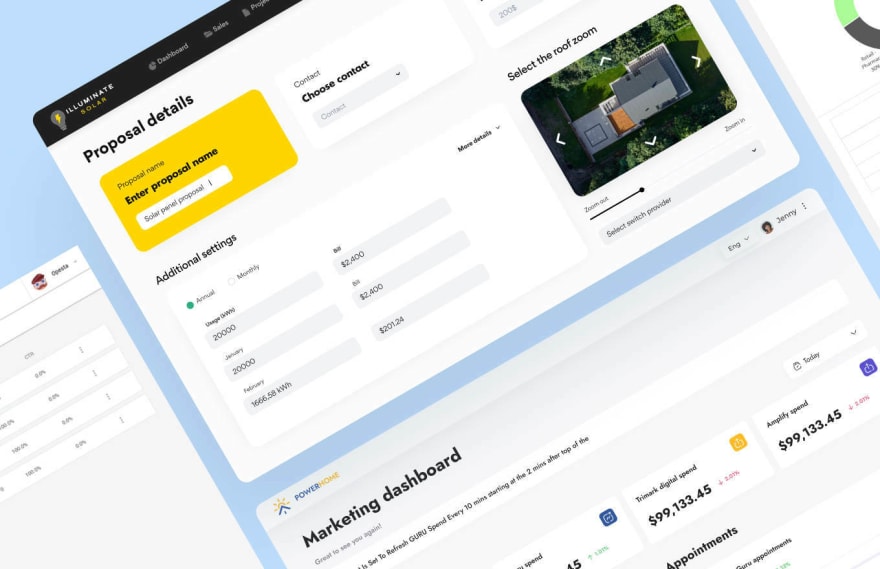The original article was written by SoftFormance https://www.softformance.com/blog/business-analytics-data-science-ideas/
Businesses in most industries these days use data science for their projects and business growth. Business owners realize that it is high time to jump on this bandwagon and use data science while it’s trending and brings businesses the most benefits.
Machine learning and AI are among the top used technologies now, and they can be used practically anywhere: targeted advertising, eCommerce, internet search, education, medicine, video streaming, you name it.
However, knowing the definition of data science is one thing, but you also need to understand how to use it wisely and generate ideas for your business that will bring you profit, boost your growth, make the delivery automated, and will benefit all departments of your organization.
Don’t worry, though! Thousands of companies these days use data science – more than 65% of organizations invested in analytics in 2020 and this number continues to grow rapidly.

Thus, if you want to join these companies and start to grow your business using data science, but you are in need of fresh ideas – you can use this article as your guide and source of inspiration as we will talk about the businesses that use data science, AI, machine learning, and analytical tools for years.
Data Science Benefits for Your Business
Data has been called “the oil of the 21st century,” and for a reason. There’s just so much of it that one can’t help but wonder: what do I do with it to benefit my business?
That’s where data science comes into the picture. Data science is the process of using different techniques and tools to extract useful insights from all the data that there is. It combines programming skills, domain expertise, and knowledge of statistics, maths, and analysis.
Before jumping into the data science startup ideas, you need to understand why exactly you need data science and how it will benefit your company. In this article, we have discussed the benefits of data science in detail, but let’s summarize them once again here.

Increases business predictability
Data science involves analysis, and analysis means higher predictability. It is essential for any business that wants to avoid errors and extract more valuable insights. This thorough analysis helps you make decisions that will have a positive impact on the future of your business as you can predict the outcomes more easily.
Innovation and new products
Data science allows business owners to collect and analyze information about customers, do it faster and more effectively, and be able to make accurate predictions about customers’ decisions and future trends. As a result, it is much easier to come up with new ideas, innovate, and create new products.
Improves the decision-making process
Data science is a great booster for the decision-making process in any organization. Newly developed systems that allow viewing data in real-time increase the agility of your business managers, and business executives have more flexibility. For example, you can use dashboards and projections enabled by a data scientist’s data treatment.
Ensures real-time intelligence.
When data scientists collaborate with RPA professionals, they can identify various data sources of their business to create automated dashboards. Since these dashboards search for data in real time, it helps an organization make more accurate decisions and do it faster.
Improves your business’s data security
The data scientists work on fraud prevention systems. These systems keep customers safer. Furthermore, with data scientists, it is possible to identify possible architectural flaws.
Favors the marketing and sales area
Marketing is data-driven these days. Data scientists help organizations collect more insights about their customers and use this data to improve their marketing operations. With data science, it is possible to obtain the entire customer journey map and understand one’s customers better.
With all these benefits, it becomes clear that it is high time to start using data science for your business, but you also need a clear strategy to see all the benefits in practice. We have discussed data science strategy in detail here, so make sure to get acquainted with it before reading about the business ideas.
The Top Data Science Business Ideas
There are numerous ways how you can use data science for your business, the choice depends on your capabilities, interests, and goals. Let’s look at a couple of the most profitable data science ideas for business that you can use.

Build an analytics tool
Analytics tools help people make data-driven decisions, and you can help people do it by providing them with the ability to access, visualize, and analyze the data.
If you have a great team of experienced experts with strong technical skills, building an analytical tool can be a profitable business idea.
For example, QlikView is one of the best analytical tools on the market. In 2022, it generated $750M in revenue. According to the app’s website, it closes the gap between data, insights, and action with the only cloud platform built for Active Intelligence.
Other analytics tools include Microsoft Power BI, Tableau, Looker, Klipfolio, and Zoho Analytics.
Here are the steps for creating your own analytics platform:

Business analysis
Business analysis is an essential step in building any application, especially if you’re creating an analytics tool. First, set your business objectives and identify the mission of your future project.
Second, examine your domain: analyze the market segment you plan to enter, review your competitors’ solutions, and analyze their strengths and weaknesses. Next, identify functional and non-functional requirements.
Visualizing and design
When you move on to this step, make sure to prioritize information architecture. An analytical tool should be structured in a way that allows each user to understand how everything works.
IA (Information Architecture) includes a lot of parameters: infrastructure and hierarchy, platform navigation, functionality arrangement, and others. Thus, the success of your platform depends on its IA. If you want to learn more about the specifics of UI/UX design, read this article.
Development
There are three approaches to building an analytics tool: using already existing software solutions, developing from scratch, or merging the two approaches.
Using already existing software solutions
Usually, business owners choose to use already existing software solutions when they are about to create an MVP version of their product. This strategy allows you to test the viability of your idea and identify its weaknesses.
First, you need to extract data from some sources. External data sources include ERP, CRM, flat files, etc. To create an MVP of an analytics tool, you may choose one of these platforms. Popular ETL (extract, transform, load) providers include Apache Airflow, Xplenty, AWS Glue, and Stitch.
After the ETL process, data is loaded into the data warehouse. There are three types of data warehouse architecture (single, two, or three-tier). Choose a data warehouse that is voluminous enough to store all your data. Examples of warehouses include Hadoop, AWS S3, AWS Redshift.
The next step is data modeling. A data modeling component extracts data from the warehouse and prepares it for mapping, but you would need to develop this component from scratch since there are no corresponding market solutions.
Then, the time comes for monitoring and administration. It ensures that all components of the data analytics tool are properly functioning. Popular monitoring tools include Amazon CloudWatch and Site24x7.
Finally, you would need to develop a query builder to connect the data warehouse and data modeling component and then move on to data visualization. The tools for data visualization include JasperReports, Sisense, and Grafana. Data visualization involves the creation of graphs, reports, dashboards, etc.
Development from scratch
This is the most time, money, and resources consuming strategy. A great idea would be to use this strategy if your MVP satisfies your business requirements, and you are ready to transform it into a final functional product. If you want to build an analytics tool from scratch, you need a team of experienced developers, so consider this as well.
Merging the two approaches
This approach is a perfect mix of the previous two strategies. You can use it if you have already started developing the MVP version of the analytics tool and understood that some solutions do not work for your project, and you need to develop them from scratch.
Start a healthcare startup
Data science is frequently used in healthcare. This sector benefits from data science the most. It was back in 2008 that data science was first used in the healthcare industry when Google created Google Flu Trends – a map of documented flu cases. Even though the project was not successful at first, it demonstrated great potential for the use of data science in healthcare. Now, data science is used in healthcare for these purposes:
Medical image analysis
Genetics & genomics
Drug development
Virtual assistance for patients and customer support
The most popular projects that use data science for healthcare include Google, Clue, Oncora Medical, and Veeva.
Google
Since the failed attempt in 2008, Google hasn’t abandoned its attempts to apply data science to healthcare.
The company developed LYNA – a tool that helps identify breast cancer tumors that metastasize to nearby lymph nodes. Even though more testing is required, LYNA can accurately identify metastatic cancer 99% of the time.
Clue
The Berlin-based Clue app forecasts users’ menstrual cycles and reproductive health. It tracks cycle start dates, moods, hair conditions, and other metrics. Data scientists mine all this data with Python and Jupyter’s Notebook. Users get notifications when they are most fertile, when the next period is going to start, or when they are on the cusp of pregnancy.
Oncora Medical
Oncora is based on software that uses machine learning to create personalized recommendations for current cancer patients based on data from past ones. The data collected for this app includes diagnoses, treatment plans, outcomes, and side effects from more than 50,000 cancer records.
Veeva
Veeva is a cloud software company that provides software solutions and data for the healthcare industry. The company works in clinical, regulatory, and commercial medical fields.
MyOme
We have also created a healthcare project MyOme that uses the latest algorithms and computational capabilities to help people determine the risk of rare and common hereditary conditions. A person takes a DNA test, and MyOme analyzes data and provides reports on-demand to answer all clinically relevant questions throughout the person’s lifetime.
Start an e-commerce startup
Online shopping has almost become a substitute for offline shopping. More and more people choose to shop without leaving their houses instead of going to shopping malls.
Thus, online retailers now allow people to create their personal profiles where they can track their orders, save their wishlists, and many more.
Some stores can even adjust their prices based on people’s ability to pay. Here are examples of apps that use data science to personalize the online shopping experience:
Sovrn
Sovrn is used by advertisers and outlets like ESPN and Bustle to sign deals. Since these deals happen millions of times a day, this application has collected tons of data for analysis, insights, and improvements to its advertising technology. Sovrn interface can monetize media with minimal human oversight.
Airbnb
Airbnb uses data science to improve its search function. Now, the app prioritizes the search rankings of a rental if it’s in an area that has a high density of Airbnb bookings. People can look for rentals in cool neighborhoods rather than merely focusing on price and availability.
Instagram
Instagram also uses data science. Mainly, it uses data science to target its sponsored posts. Meta, Instagram’s owner, has tons of data on many users, including their age, education, shopping preferences, and search history. Thus, Instagram uses this data to craft algorithms that convert all this data into predictions of what people might want to buy.
Start a CRM business
A CRM, or Customer Relationship Management software, keeps track of your prospects, clients’ info, and their contacts, and it helps you monitor sales and create reports. Here, data science is used for collecting, storing, and analyzing customer data, forecasting, and information management.
The CRM market is a $50B and growing industry. The correct CRM helps achieve lead management, sales forecasting, and even instant messaging between your employees, tracking emails, and integration with Gmail and Outlook.
Famous CRM systems include Salesforce, SAP, ZOHO, Oracle, Microsoft Dynamics, Nimble, and others.
CRMs provide a better customer-client relationship, boost staff, and client satisfaction, support cross-functionality, and reduce overall costs and manual efforts.
LocalPower
LocalPower is also one of our projects. It is a roof design tool with the automated best placement of panels on top of it. We have created a CRM for solar panel agencies with a unique Roof Design Tool and proposal. Moreover, we have worked on front-end solar software, modeling, proposal, and project management by applying data science.
Develop an online survey tool
All businesses need to gather customer feedback, and online survey tools help them with it.
Thus, one of the data science business ideas is to create a tool like this. Usually, an online survey tool includes a survey builder, a data collection tool, and a reporting system.
One of the most popular online survey tools is Typeform. This tool allows customers to ask questions and gather their feedback. Typeform includes built-in photo and video libraries, custom layouts and themes, and a sleek interface that ties it all together.
Taking into account the demand for data collection these days, building an online survey tool is a great idea, and you can be among the top companies doing it right now.
Start a music streaming app
In recent years, the global music streaming market recorded a CAGR of 14.7%, and it is expected to reach $29.45 billion in the next few years.
All music streaming apps available on the market these days use data science to collect information about the users, their listening habits, statistics, and preferences. Then, using machine learning and AI, the apps create personal playlists for the users, recommend new music, and make their listening experience more personalized.
For example, let’s look at Spotify. Using CNN (convolutional neural networks), Spotify analyzes raw data such as the song’s BPM, musical key, loudness, etc., to classify songs based on music type and further optimize its recommendation engine.
Data science and analytics are also used by Spotify‘s marketing department to ensure that the record sells.
Enter the video gaming market
In 2021, the global video game market was valued at $195.65 billion, and it is expected to grow by nearly 13% by 2030.
AI and data science have been used in video games for decades, and now the ways to implement data science in gaming are growing at an incredible pace.
Here are some examples of the use of data science in gaming.
Activation Blizzard
This company is behind popular games like World of Warcraft, Call of Duty, Candy Crush, and Overwatch. Activision Blizzard uses big data to improve people’s gaming experiences.
Unity
Unity creates and operates interactive, real-time 3D content, including games. Companies like Riot Games, Respawn Entertainment, and Atari use Unity to make data-driven decisions to monitor business metrics.
2K
2K Games is a studio that has created Bioshock and Borderlands, as well as PGA and WWE games series. It extracts gaming data and builds models to improve its sports games. The studio also uses data to analyze players’ behavior and suggest how to improve their player experience.
Build a social media platform
People share a lot of information about themselves on social media: their age, education, occupation, places they visit, what they watch, listen to, etc. All the friendships, relationships, and even coworker connections leave tons of data that can be collected and used by various companies.
Many relationships these days begin online: friendships, romantic relationships, and working relationships, and the data about a user influences who they will meet next online. Here is how data science is used by social media platforms:
Meta
One of the most popular features that Meta uses data science for is the “People You May Know” sidebar. It appears on Facebook, Instagram, and other Meta platforms’ home screen, and it is based on people’s friend lists. It is also based on a great algorithm that uses a type of data science known as network science.
Tinder
When people match on Tinder, it is thanks to the company’s data scientists. The app uses an algorithm that boosts the probability of matches, showing users those people who they will most probably like. It also prioritizes matches between active users, those who are near each other, and people that might be each other’s “type.”
Kidiboard
One of the recent projects that we have finished is KidiBoard. It’s an application for parents that contains both a marketplace and a social network. Parents who use KidiBoard can connect with each other, find clubs, seminars, and activities for their kids, and even look for personal tutors there. Users can look for art classes for their kids, yoga, photography courses, and other activities in their location. They can also chat with other users and make posts on their feed.
More SoftFormance cases
At SoftFormance, we believe that because of the many data science benefits, it promotes growth and boosts effectiveness, and our aim is to apply it to as many of our projects as possible. In recent years, data science has helped us successfully finish projects like DashPro & AdsPro, Revenue Compass, Opesta, LocalPower, and others. Let’s talk about them shortly.

DashPro is an analytics platform for Solar Panel Agency. There is a Dashboard tool to collect and adjust data from different sources, like Facebook and SalesForce. That is where data science was applied – we created a tool for the collection and analysis of data as well as for extracting valuable insights for Solar Panel Agency.
AdsPro is a Facebook ads management tool for one of our previous clients. It allows setting up FB Ads Customer Segments API and Bid Multiplier APIs, with a custom ads builder. We used data science to identify customer segments, analyze reviews, and recommend specific products.
Revenue Compass is the fastest, most advanced, and most user-friendly commercial intelligence platform designed to enable fast-moving consumer goods manufacturers to reduce enterprise-wide price leakages, optimize trade spending and maximize value capture by charging every channel partner prices that are uniquely right for them.
Opesta is a marketing automation SaaS app that instantly increases open rates, click-through rates, and conversions by providing everything you need to generate leads, market, and sell using Facebook Messenger. We utilized data science to identify a potential customer base, for forecasting their potential needs, and analyze what would sell best.
Wrapping up
Data is everywhere these days, and there’s an unbelievable amount of it. That is why organizations are actively using it and coming up with new business ideas that would allow them to apply machine learning and AI to their greatest benefit.
It is essential to know what data science is, how it works, and how to build an effective strategy, but you also need to know how to put it into use and make your ideas a reality. Thankfully, there are multiple examples of successful cases on the market.
Thus, if you are not sure yet which path to take, you can just get inspired by these cases and analyze which one suits your business objectives best.
You can either occupy an empty niche in the market, with little to no competitors or create a product that has numerous analogs but makes it unique and broaden your client base. There are multiple ways to use data science, you just need to find your perfect patch.
A clear vision and an idea are the keys to success. Therefore, if you need help in developing your vision or need a consultation, contact us.
FAQ
When is the best time to contact data science experts, before launching your project or after launching?
The best time to consult data science experts is before you start working on the project. Share your ideas, vision, and expectations with the data science team, and they will help you get on the right path, and save time and resources.
What do data scientists need to successfully influence my project?
When looking for data scientists, make sure that they have experience in working on projects similar to yours and that they share your vision and business goals. Furthermore, they need to have both strong technical and non-technical skills. They should be skilled in statistical analysis, deep learning, machine learning, data visualization, programming, big data, mathematics, and processing large data sets. Moreover, it is important that they are great team players and can communicate with other team members effectively.
Where can I find data science talent that can help me implement my ideas for my project?
Remember that data scientists come from everywhere! They are very diverse in their education and background. There are numerous data scientists who have backgrounds in software engineering or data analysis roles, which are very common pathways to data science.
The key is to know the role you are actually hiring for. For example, if you need a data scientist, but your role is heavy on engineering, hire an expert who has experience in engineering.



Top comments (0)